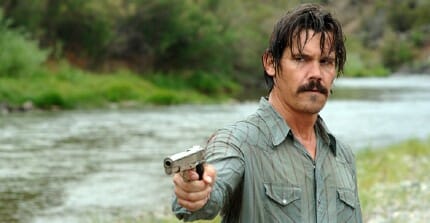No Country For Old Men

Dusk to Dusk
Coens return in stark hail of creatively splattered blood
Release Date: Nov. 21
Directors: Joel and Ethan Coen
Writers: Joel and Ethan Coen, Cormac McCarthy
Cinematographer: Roger Deakins
Starring: Tommy Lee Jones, Javier Bardem, Josh Brolin, Woody Harrelson, Kelly Macdonald
Studio/Run Time: Miramax/122 mins.
Western novelist Cormac McCarthy’s “obsolete vernacular”—as Royal Tenenbaums McCarthy parody Eli Cash calls it—is the music that sings through No Country For Old Men, the Coen brothers’ stunning new adaptation of the Pulitzer winner’s 2005 book. With a higher and far grizzlier body count than the last three Coens’ pictures combined, McCarthy’s southwest is the perfect landscape for the now ?ftysomething Minnesota ?lmmakers to rediscover their bloody, moody roots. It’s been a long time since Joel and Ethan Coen took themselves this seriously. Perhaps since 1991’s Barton Fink. The result is suspenseful and uncompromising.
In a ?awless merging of voices, the Coens subsume themselves in McCarthy’s own intense stylization instead of relying on the screwball-in?uenced rhythms that hit the tone for three of their last four ?lms. Set in rural Texas in 1980, as a sociopathic killer (Javier Bardem’s splendidly coiffed Anton Chigurh) chases a stoic everyman (Josh Brolin) and a bundle of misplaced drug money across the state, the novel and ?lm are both held together by characters the Coens have always been transcendent with: hotel clerks, salesmen, and other small-timers.
-

-

-

-

-

-

-

-

-

-

-

-

-

-

-

-

-

-

-

-

-

-

-

-

-

-

-

-

-

-

-

-

-

-

-

-

-

-

-

-








































